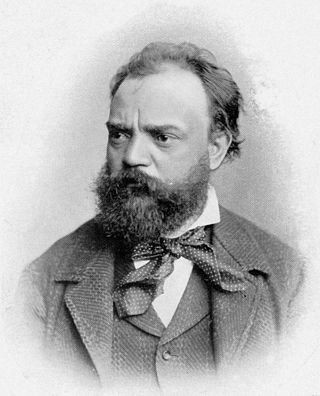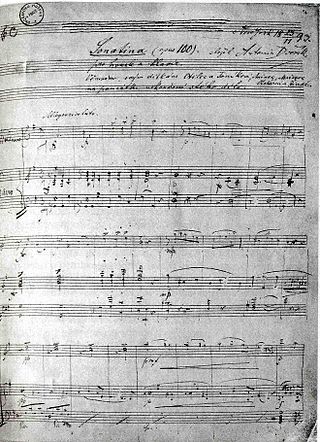Related Research Articles

Antonín Leopold Dvořák was a Czech composer. Dvořák frequently employed rhythms and other aspects of the folk music of Moravia and his native Bohemia, following the Romantic-era nationalist example of his predecessor Bedřich Smetana. Dvořák's style has been described as "the fullest recreation of a national idiom with that of the symphonic tradition, absorbing folk influences and finding effective ways of using them," and Dvořák has been described as "arguably the most versatile... composer of his time".

A string quintet is a musical composition for five string players. As an extension to the string quartet, a string quintet includes a fifth string instrument, usually a second viola or a second cello, or occasionally a double bass.
G minor is a minor scale based on G, consisting of the pitches G, A, B♭, C, D, E♭, and F. Its key signature has two flats. Its relative major is B-flat major and its parallel major is G major.
A minor is a minor scale based on A, with the pitches A, B, C, D, E, F, and G. Its key signature has no flats and no sharps. Its relative major is C major and its parallel major is A major.
B minor is a minor scale based on B, consisting of the pitches B, C♯, D, E, F♯, G, and A. Its key signature has two sharps. Its relative major is D major and its parallel major is B major.

The String Quartet No. 12 in F major, Op. 96, nicknamed the American Quartet, is the twelfth string quartet composed by Antonín Dvořák. It was written in 1893, during Dvořák's time in the United States. The quartet is one of the most popular in the chamber music repertoire.
A bagatelle is a short piece of music, typically for the piano, and usually of a light, mellow character. The name bagatelle literally means "a short unpretentious instrumental composition" as a reference to the light style of a piece. Although bagatelles are generally written for solo piano, they have also been written for piano four hands, harpsichord, harp, organ, classical guitar, vibraphone, unaccompanied oboe, clarinet, violin, viola, various chamber-music configurations, orchestra, band, voice and piano, and a cappella choir.

Antonín Vranický, Germanized as Anton Wranitzky, and also seen as Wranizky, was a Czech violinist and composer of the 18th century. He was the half brother of Pavel Vranický.
Antonín Dvořák's Serenade for Strings in E major, Op. 22 (B. 52), is one of the composer's most popular orchestral works. It was composed in just two weeks in May 1875.
Antonín Dvořák's String Quintet No. 2 in G major, Op. 77 (B. 49), was originally composed in early March 1875 and first performed on March 18, 1876 in Prague at the concert of the Umělecká beseda.

The Sonatina in G major for violin and piano, Op. 100, B. 183, was written by Antonín Dvořák between November 19 and December 3, 1893, in New York City. It was the last chamber composition he wrote during his sojourn in the United States. Dvořák catered the sonatina to the gradually developing musical abilities of his children, especially those of his 15-year-old daughter Otilie and 10-year-old son Toník, who played piano and violin respectively. In a letter to Fritz Simrock on January 2, 1894, Dvořák conceived the piece in the following terms: "It is intended for youths, but even grown-ups, adults, should be able to converse with it..." The sonatina was published by Simrock in Berlin in 1894. It also exists in a version for cello and piano.
The String Quintet in E♭ major, Op. 97, B. 180, was composed by Antonín Dvořák during the summer he spent in Spillville, Iowa in 1893. It is a "Viola Quintet" in that it is scored for string quartet with an extra viola. It was completed in just over a month, immediately after he wrote his American String Quartet. Like the Quartet, the Quintet finely captures the inflection of Dvořák's Bohemian idiom with American inspirations. The Quintet was premiered by the Kneisel Quartet in New York on 13 January 1894 along with the second performance of the Quartet and very favorably reviewed, as comparable to Mozart. The reviewer noted that the Quintet was "of the kind about which a commentator may write a small volume without exhausting his admiration or fully describing their beauties".
Antonín Dvořák's Piano Quintet No. 2 in A major Op. 81, B. 155, is a quintet for piano, 2 violins, viola, and cello. It was composed between August 18 and October 8, 1887, and was premiered in Prague on January 6, 1888. The quintet is acknowledged as one of the masterpieces in the form, along with those of Schumann, Brahms and Shostakovich.

František Ondříček was a Czech violinist and composer. He gave the first performance of the Violin Concerto by Antonín Dvořák, and his achievements were recognised by the rare award of honorary membership of the Philharmonic Society of London in 1891.
The Sonatina for Violin and Harpsichord is a three-movement, neoclassical chamber work composed by Walter Piston in 1945, that marks the beginning of his postwar style.

The Pražák Quartet is a Czech string quartet established in 1974. It is one of the Czech Republic's premiere chamber ensembles. It was founded while its members were still students at Prague Conservatory (1974–1978). The quartet was awarded First Prize at the Evian International Competition in 1978 and the Prague Spring Festival Prize in 1979 with second places not being awarded at both the competitions to indicate the difference in level.
In 1887, Antonín Dvořák selected 12 of the 18 love songs from his collection Cypresses, B.11, of 1865, and arranged them for string quartet, B.152. He also named these 12 pieces Cypresses. The 12 pieces he selected from B. 11 are Nos. 2–4, 6–9, 12, 14, and 16–18; the original songs are for solo voice and piano, and are settings of poems by Gustav Pfleger Moravský from the collection "Cypresses".
The String Quintet No. 1 in A minor, Op. 1 (B. 7), is a string quintet by Antonín Dvořák, scored for two violins, two violas and cello. Composed in 1861, it is the first piece to which he assigned an opus number and the work with which he, at age 20, launched his career as a composer. It was not premiered until 1921, 17 years after his death, and first published in 1943.
The Piano Quintet No. 1 in A major, Op. 5 (B. 28), is a piano quintet by Antonín Dvořák, scored for two violins, viola, cello and piano. Composed in 1872 in Prague, it was premiered in November that year. It was not published then and Dvořák lost the autograph over the years, having to ask a friend for a copy when he revised the work in 1887. The revised version was not performed until 1922, 18 years after his death.

The Mass in D major, Op. 86, is a mass composed by Antonín Dvořák in 1887. It is also called Lužanská mše after the chapel in Lužany for which it was written. It was first a work for soloists, choir and organ, and expanded to an orchestra version in 1892.
References
- ↑ Chris Woodstra; Gerald Brennan; Allen Schrott, eds. (2005). "Bagatelles for 2 violins, cello & harmonium, Op. 47". All Music Guide to Classical Music. Backbeat Books. p. 404. ISBN 0-87930-865-6.
- ↑ "Bagatelles, Op. 47 (Antonín Dvořák)". Los Angeles Philharmonic. Retrieved 6 March 2020.